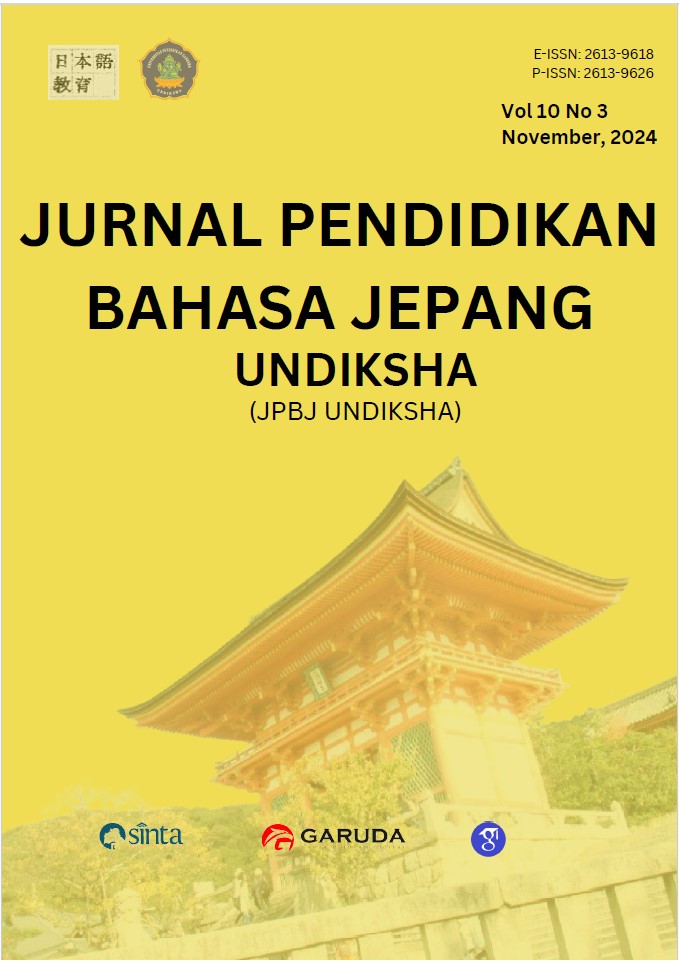Analisis Video Pola Hidup Lansia di Kota Tokyo
DOI:
https://doi.org/10.23887/jpbj.v10i3.73124Keywords:
POLA HIDUP, LANSIA, TOKYO, JEPANGAbstract
This journal discusses the lives of the elderly in the city of Tokyo, Japan, which is experiencing significant demographic changes and has a rich culture. The elderly in Japan are respected as guardians of traditional values, but face challenges such as changes in family structure, social isolation, health problems, and the impact of economic and technological change. Previous research has explored eating patterns, cultural values such as ikigai, the digital divide, and intergenerational interactions.
This research adopts a unique approach using video analysis to further understand the lifestyle of elderly people in the city of Tokyo. Research methods involve qualitative analysis, document analysis, and visual observation. Qualitative findings involve the social dynamics, activity patterns, and emotional well-being of older adults. Document analysis highlights senior-friendly urban policies and social/recreational programs. Visual observations reveal emotional expressions and inequalities in the accessibility of public facilities.
The results of the integration of findings from the three methods show that social involvement and various activities contribute to the well-being of the elderly. Accessibility challenges need to be addressed through inclusive urban planning, while public policy can play an important role in creating an environment that supports the quality of life of seniors. Emphasis is also placed on the emotional aspects and mental well-being of the elderly. By synthesizing these findings, the research provides a strong basis for the development of effective policies and programs in supporting the well-being of older people in a dynamic urban context and the findings from these three methods, we can form a holistic view of the lives of older people in the city of Tokyo.
References
Garcia, M. (2016). The Ikigai Diet: The Secret Japanese Diet to Health and Longevity. Random House.
Hirai, M. (2019). Aging and Generational Relations Over the Life Course: A Historical and Cross-Cultural Perspective. Springer.
Sakurai, R. (2020). Challenges and Opportunities for the Elderly Population in Aging Societies. Frontiers in Public Health, 8, 123.
Smith, K. (2018). Aging in Asia: A Systematic Comparative Review of Public Opinion. The Journals of Gerontology: Series B, 73(5), 808–818.
Suzuki, K. (2020). The Japanese Mind: Understanding Contemporary Japanese Culture. Tuttle Publishing.
Saito, N., & Takahashi, H. (2017). Digital Inequality and Participation in Japan. The Information Society, 33(2), 59–70.
Suzuki, K., & Hirai, M. (2017). Intergenerational Relationships and Old-Age Well-being in Japan: A Comparison of Fathers and Mothers. Journal of Aging and Health, 29(5), 767–788.
Tanaka, A., & Naka
Tanaka, A. (2018). Aging in Japan: Contemporary Theory and Research. Routledge.
Yamamoto, H., & Suzuki, K. (2015). Dietary patterns and health among the Japanese elderly: a review of the literature. Asia Pacific Journal of Clinical Nutrition, 24(1), 1–8
Downloads
Published
Issue
Section
License
Copyright (c) 2024 Jurnal Pendidikan Bahasa Jepang Undiksha

This work is licensed under a Creative Commons Attribution-ShareAlike 4.0 International License.



